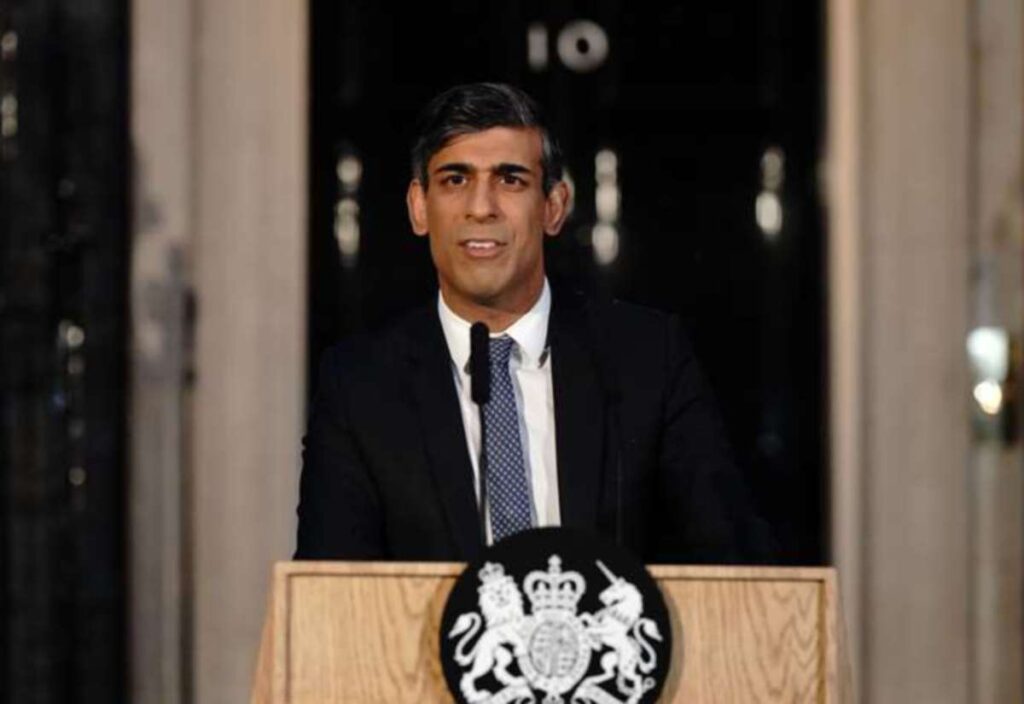Prime Minister Rishi Sunak is expected to call a general election.
He is due to make an announcement outside Downing Street at 5pm – revealing that voters will head to the polls on July 4.
Mr Sunak, who has been PM since October 22 2022, when he replaced Liz Truss, will then travel to Buckingham Palace to ask the King to dissolve parliament.
Speaking at PMQs this lunchtime, the PM repeated his insistence an election would take place in the second half of the year amid mounting speculation he could have his eye on a summer polling day.
SNP Westminster leader Stephen Flynn said: “Speculation is rife, so I think the public deserve a clear answer to a simple question. Does the Prime Minister intend to call a summer general election or is he feart?”
Mr Sunak replied: “There is, Mr Speaker – spoiler alert – there is going to be a general election in the second half of this year.
“At that moment, the British people will in fact see the truth about the honourable gentleman opposite me (Labour leader Sir Keir Starmer), because that will be the choice at the next election, Mr Speaker – a party that is not able to say to the country what they would do, a party that would put at risk our hard-earned economic stability, or the Conservatives that are delivering a secure future for our United Kingdom.”
It follows a difficult period for the Conservatives, who have suffered two defections by backbench MPs and a drubbing at the local elections earlier this month.
Polls continue to suggest the Tories are on course to lose the forthcoming vote, with Labour retaining a double-digit polling lead.
The latest possible date Mr Sunak could hold the election is January 28, 2025.
At the last election in December 2019, former Tory leader Boris Johnson cemented a Conservative majority.
It was the same for Kent, with the Tories taking the majority of seats apart from Rosie Duffield’s (Lab) Canterbury seat.
Analysis from political editor Paul Francis
With the confirmation there is to be an election, it will be a gamble rather than a carefully calibrated step for the Conservatives.
Inflation may be falling but so too are the poll ratings of the party and the PM’s own approval numbers are among the lowest of any occupant of Downing Street.
So, will a July poll help lift the fortunes of the Tories or will it simply mean the party might just limit its losses rather than go into a severe tailspin and a crash landing?
Ask the bookies – normally a decent barometer – as to the outcome and the odds seem to favour Sir Keir Starmer moving into Downing Street.
For Kent, the parties will be fighting on a political landscape much changed since 2019.
That of course was the Brexit-election which played to the Conservatives’ strengths.
While significant swathes of the county remain true blue Tory, there is a sense their grip is loosening.
For some voters, it is simply a case of giving someone else a try; for others, it will represent an opportunity to punish those they feel have let the country down.
There are some issues which are more pertinent to Kent than others, notably the continuing arrival of boatloads of migrants to our shores.
The PM promised to get a grip on the numbers and made that commitment in a keynote speech in Dover itself.
For a very brief period, the numbers did fall. But soon they were up again.
As of April 21, 6,265 people had crossed the English Channel in small boats since the start of year.
That is up by nearly a quarter compared to the same period the year before.
This hardline approach to the use of hotels to accommodate migrants similarly failed – having initially cut costs, It was not long before the bill was up again.
In March, it emerged the government spend on hotels was higher than ever, with a £600m year-on-year increase.
As to the question of who will win against this backdrop it should be Labour.
As to the other parties – the Lib Dems, Reform and Greens – all appear to be benefitting but perhaps not on a scale that will deliver them parliamentary seats.
In Tunbridge Wells, the Lib Dems are convinced the seat is ‘in play’ and feel they have a chance of winning – which would be transformational for the party.
Labour appears to be confident of securing Canterbury again and will be banking on its coastal strengths – particularly Dover where the sitting MP Natalie Elphicke sensationally defected to Labour from the Conservatives.
She is stepping down at the election as are long-serving MPs Gordon Henderson (Sittingbourne and Sheppey) and Tracey Crouch (Chatham and Aylesford).
And the Medway Towns ought to be fertile ground for Labour after winning control of the council for the first time in 20 years.
But as is often said, the only poll that really matters is the one on election day. Roll on July 4.




